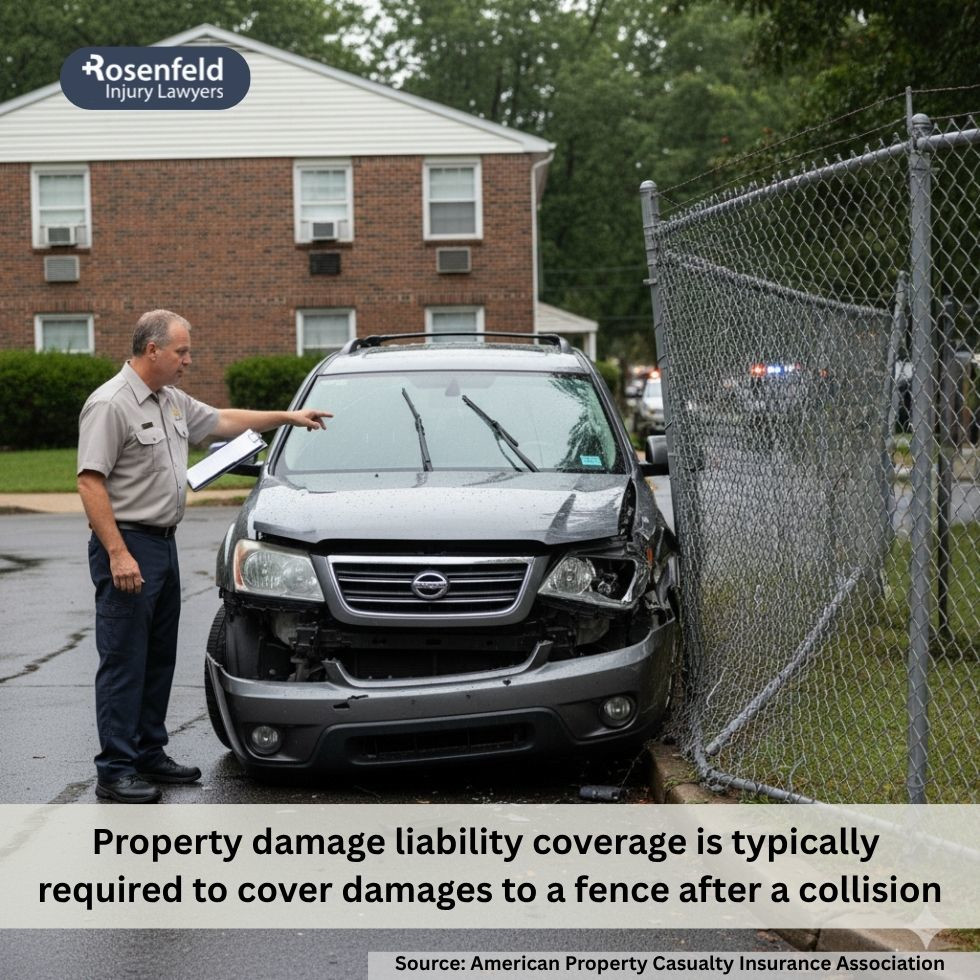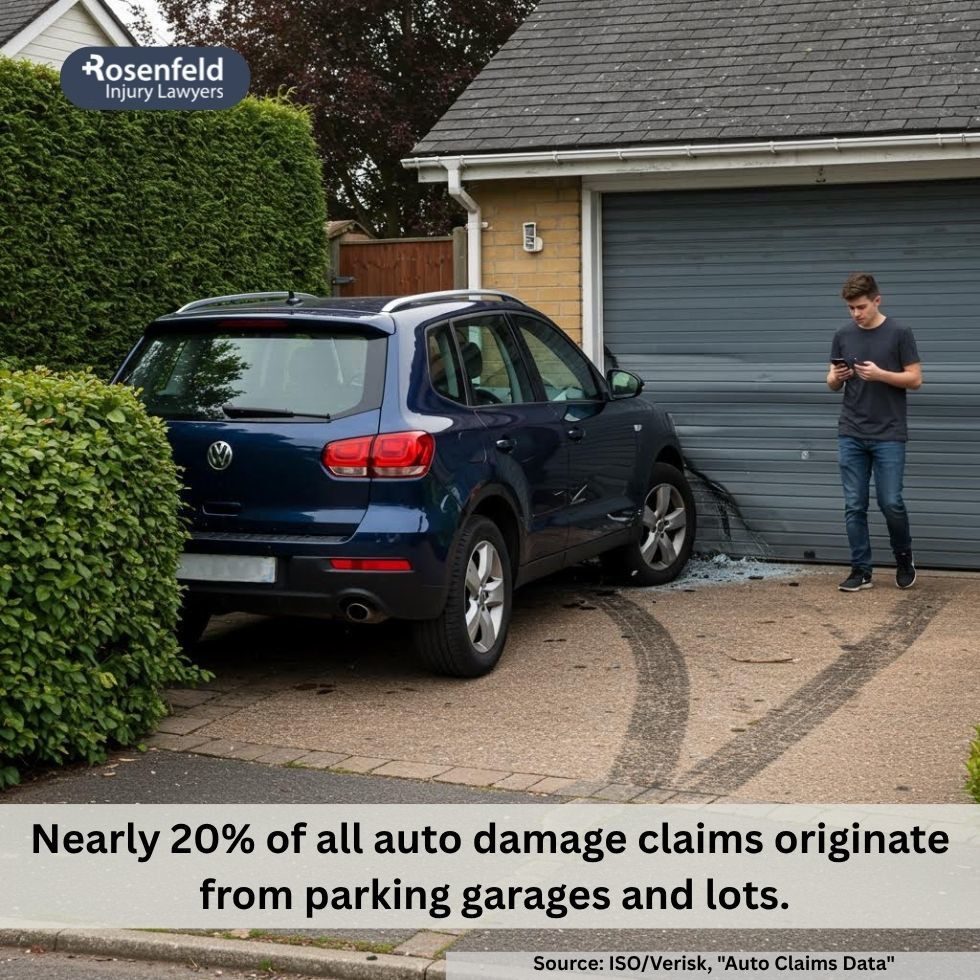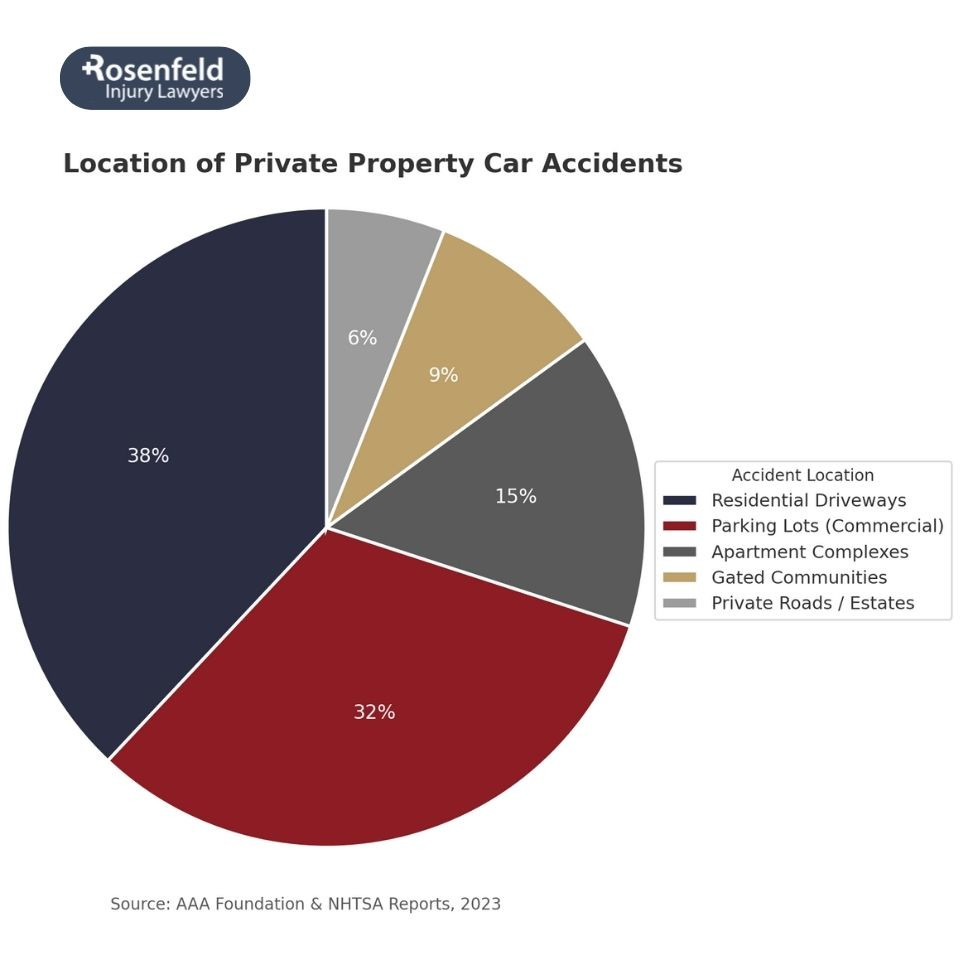- 24/7 Free Consultation: (888) 424-5757 Tap Here To Call Us
Private Property Car Accident

While any car accident can be stressful, a private property accident brings unique legal and insurance challenges. When it comes to a private property car accident, the normal rules don’t always apply, and determining liability can be more complicated.
Our Chicago car accident law firm helps clients navigate the complexities of private property accidents. This page explains how these accidents work, what steps to take, and when to contact an attorney.
Common Locations for Accidents on Private Property
A car accident on private property can happen in many everyday places, including:
- Parking lots at malls, grocery stores, apartment complexes, and offices
- Garages in residential and commercial buildings
- Private driveways and private roads
- Business premises
- Incorrectly parked cars on driveways
- Other properties open to the public
These areas are prone to collisions because of tight turns, limited visibility, and unclear signage — all of which make it easier for one or more drivers to make a mistake.

How Private Property Car Accidents Differ from Those on Public Roads
Standard traffic laws, such as speed limits or stop sign enforcement, may not fully apply on private property.
In many cases, the property owner may share liability. Slippery surfaces, poor construction, or a lack of proper signage may make the private property owner and the at-fault driver partially responsible.
Additionally, if the accident occurs in a private location, police may not issue citations or file an official police report. This makes physical evidence, witness testimony, and documentation critical.
Do Illinois Traffic Laws Apply When an Accident Occurs on Private Property?
While state statutes like the “Rules of the Road” may not be fully enforceable by citation on private property, Illinois still follows the legal principles of negligence. Drivers are expected to behave reasonably and safely, regardless of where they are driving.
Determining Fault – Negligence Principles Still Apply
The key to determining the at-fault party in an accident is establishing fault through negligence.
Courts and insurance companies look at whether a driver acted with reasonable care. Even without a traffic citation, fault can be assigned based on driver behavior and the surrounding accident scene.
Common Causes of Car Accidents on Private Property
Privately owned property often introduces specific risks. Some of the most frequent causes of crashes on private property include:
- Failing to yield
- Backing out of a parking space without checking
- Speeding through a parking lot
- Ignoring arrows or signage
- Distracted driving
- Obstructions or poor design

The Role of the Police – Will They File an Accident Report?
You should still call the police if injuries are involved, even for a minor accident on private property. While officers may not always issue citations or create a full accident report, having documentation can still support your claim.
If the police won’t write an official police report, ask them to log the incident. In the meantime, start gathering your own evidence. The more detail you can provide to your legal team to identify the at-fault party, the better.
Steps to Take Immediately After a Car Accident on Private Property
Taking the right steps in the moments after the accident can significantly strengthen your insurance claim and protect your legal rights to fair compensation.
1. Seek medical attention immediately if anyone is hurt
Call 911 if you or anyone else appears injured, even if the injuries seem minor at first. Some conditions, like internal injuries or soft tissue damage, may not be obvious right away but can worsen without prompt care.
2. Call the police and request a police report
Report the car accident to local authorities. Having an officer document the incident can provide valuable support for your case later.
3. Exchange insurance information with the other party
Gather the other driver’s name, phone number, address, driver’s license number, license plate, and insurance company information. Stay calm — avoid arguing or discussing fault at the scene as you exchange information.
4. Document the accident scene thoroughly
Use your phone to take photos or video of both vehicles, visible damage, the surrounding environment (including signs, road markings, or obstructions), and any hazardous conditions like ice or poor lighting. This visual evidence can be essential, especially if police documentation is limited or nonexistent.
5. Speak to any witnesses and get their contact details.
Even if you didn’t notice them, bystanders may have seen the accident occur. Ask for the names and phone numbers of all parties involved. Statements from one or more parties can provide independent perspectives in a dispute.
6. Notify the parking lot owner or property manager.
If the crash occurred on privately owned property, alert the owner or onsite manager. Reporting the incident helps address any hazardous conditions that may have contributed to the crash.
Importance of Documenting the Scene and Gathering Evidence
In the absence of police citations or full reports, it’s critical to collect your own physical evidence. Take wide and close-up photos of the vehicles, the area where the accident occurs, and any relevant hazards, like faded signs or blind corners.
Witness statements, dashcam footage, and even footage from nearby businesses can help you establish fault and maximize your chances of successfully obtaining compensation.
Notifying the Property Owner or Manager
If a car accident occurs on a business property, private road, or in a residential complex, let the property owner or manager know. They may have procedures or evidence that could become vital to your case.
Property managers also need to be aware of any dangerous conditions, like ice, poor lighting, or obstructed views, that may have contributed to the crash.
Determining Liability: Driver vs. Property Owner
In a private property car accident, liability often rests with one or both drivers. However, in some cases, the private property owner may also be held accountable.
For example, if the other driver’s fault is clear, they may bear the majority of responsibility. However, if the property owner failed to fix a dangerous condition, both parties may share blame.
When Can a Property Owner Be Held Liable for the Accident?
You may be able to prove fault of the property owner if the accident was caused by:
- Inadequate lighting in parking areas
- Dangerous potholes, uneven pavement, or poor construction
- Obstructed views
- Missing or confusing traffic signs
- Ice, snow, or wet conditions not properly cleared
These situations may open the door to a premises liability claim in addition to your auto insurance case.
Filing Your Insurance Claim After a Private Property Crash
In most cases, you’ll file a claim with the at-fault driver’s insurance provider. If property owner negligence is a factor, your lawyer may also pursue a separate claim under their premises liability coverage.
Whether you’re seeking compensation for medical expenses, personal injury, or property damage, it’s essential to gather strong documentation and have a legal team guiding the process.

Understanding Illinois Comparative Negligence in These Cases
Illinois uses a modified comparative negligence system, which means you can still recover compensation as long as you’re 50% or less at fault. If you’re found 30% responsible, for example, your award will be reduced by that amount.
Private property accidents often involve shared blame, so it’s critical to have an expert attorney who can counter unfair blame.
Why Hiring an Experienced Lawyer is Crucial for Private Property Accidents
Private property car accidents often require a deeper investigation. Our attorneys know how to determine fault, assess dangerous conditions, and pursue claims from multiple angles.
An experienced attorney can also track down security footage, deal with uncooperative parties involved, and protect you from tactics used by the insurance company to deny or reduce your settlement.
How Our Car Accident Attorneys Investigate These Claims
Our legal team thoroughly examines every car accident on private property. We analyze the drivers’ actions, examine the property conditions, consult with experts if needed, and identify all liable parties to pursue maximum compensation.
We’re committed to helping our clients seek fair compensation for serious injuries, property damage, and the long-term effects of these often-overlooked crashes.
Frequently Asked Questions About Chicago Private Property Accidents
Should I Always Call the Police for a Minor Parking Lot Accident?
Yes. Even if the crash seems minor, calling the police creates an official record.
Can the Property Owner Refuse to Provide Security Footage?
They can — but your lawyer can formally request it during an investigation or legal proceeding.
What if the Accident Involved a Hit-And-Run in a Parking Garage?
If you were involved in a hit-and-run car accident on private property, report it immediately to the police and the owner. If the driver isn’t found, your uninsured motorist coverage may apply.
Contact Us for a Free Consultation

If you’ve been in a car accident on private property, our team is here to help. Contact us today for a free, no-obligation consultation with one of our car accident attorneys.
We’ll explain your legal options, help you gather evidence, and work to secure the financial compensation you need to move forward. Our personal injury law firm in Chicago works on a contingency fee basis, so you don’t pay unless we win.
Call (888) 424-5757 or fill out our online form.
All content undergoes thorough legal review by experienced attorneys, including Jonathan Rosenfeld. With 25 years of experience in personal injury law and over 100 years of combined legal expertise within our team, we ensure that every article is legally accurate, compliant, and reflects current legal standards.







